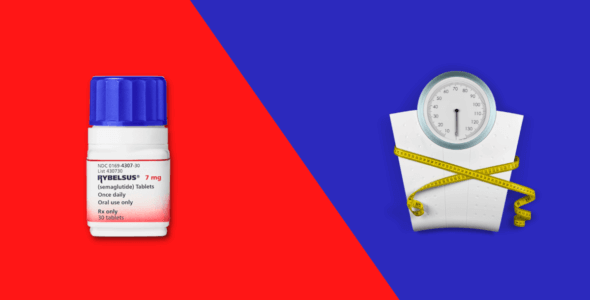Diabetes drug for weight loss: does it work?
Table of contents
Obesity is a disease within the adult population in the United States that has increased to almost 42% of the population. The highest rates of almost 50% are found in non-Hispanic Black adults and around 46% in Hispanic adults. People with obesity have been shown to be at an increased risk of other serious weight-related comorbidities such as certain types of cancer, cardiovascular disease, heart disease, strokes, hypertension (high blood pressure), metabolic disorders, and an increased risk of developing diabetes. Obesity increases blood glucose levels due to insulin resistance. Obesity has also been seen to affect the quality of life and negatively impact mental health.
Certain diabetes medications have been shown to help improve blood sugar control and cause weight loss. Here we will take a look at some of the treatments available for diabetes and how they help with weight loss.
Which diabetes drug is FDA-approved for weight loss?
Wegovy (semaglutide) and Saxenda (liraglutide), both manufactured by Novo Nordisk, are the only two brand-name diabetes drugs FDA-approved for weight management in the U.S. They both belong to the class of weight loss medications called glucagon-like peptide 1 receptor agonists (GLP-1).
Wegovy is a prescription drug approved for weight loss in adults 18 years of age and over with a body mass index (BMI) of 30 or above, or a BMI of 27 plus an associated medical condition such as high cholesterol or high blood pressure.
Saxenda is used in adults and children 12 years of age and older, along with diet and exercise for chronic weight management.
What diabetes drugs help with weight loss?
Treatments for diabetes may belong to different classes of drugs and may not all share the same mechanism of action or side effects. Certain diabetes drugs, but not all, may cause weight loss.
Treatments for diabetes that cause weight loss as a side effect include:
- metformin
- Jardiance (empagliflozin)
- Farxiga (dapagliflozin)
- Glucobay (acarbose)
- Invokana (canagliflozin)
- Januvia (sitagliptin)
- Janumet (metformin/sitagliptin)
- Ozempic (semaglutide)
- Trulicity (dulaglutide)
- sulfonylureas such as glimepiride
While some of these treatments are now FDA-approved for weight loss, others, such as metformin, are not. Metformin may be used off-label (prescribed outside of its intended FDA-approved purpose) for weight management in people without type 2 diabetes.
Once a week injections for diabetes and weight loss
The only medications available as once-a-week injections for diabetes are the GLP-1 class of medications. All GLP-1 drugs can cause weight loss. However, not all GLP-1 agonists are FDA-approved for weight loss in the U.S. GLP-1 weekly injections include:
- Wegovy (semaglutide) – the only FDA-approved (Food and Drug Administration) weekly injection for weight management in the U.S.
- Trulicity (dulaglutide) – used in combination with diet and exercise to treat type 2 diabetes in adults
- Ozempic (semaglutide) – used with diet and exercise in adults to treat type 2 diabetes
- Bydureon Bcise (exenatide) – used to help control blood sugar levels in patients with type 2 diabetes
- Tanzeum (albiglutide) – used in combination with diet and exercise to improve glycemic control in adults with type 2 diabetes mellitus
- Byetta (exenatide) – also used in combination with diet and exercise to improve glycemic control in adults with type 2 diabetes mellitus
- Mounjaro (tirzepatide) a once-weekly glucose-dependent insulinotropic polypeptide (GIP) and GLP-1 receptor agonist, the only FDA-approved dual-action GIP and GLP-1 receptor agonist for the treatment of diabetes
RELATED: GLP-1 medications: do they work for weight loss?
What is the best diabetes drug for weight loss in 2022?
Currently, the best and only FDA-approved diabetic drugs for weight loss are Wegovy and Saxenda. There is however another treatment, not currently available for weight loss but under review, called Mounjaro (tirzepatide). Obese or overweight non-diabetic individuals who took Mounjaro lost around 20% of their body weight at the highest doses.
New diabetes drug for weight loss
The US Food and Drug Administration approved tirzepatide to treat type 2 diabetes in May 2022, to Eli Lilly & Co. under the brand name Mounjaro. Mounjaro is a new drug approved as a therapy to reduce glucose in patients with type 2 diabetes.
Patients participating in the SURMOUNT-1 clinical trial on a dose of 15mg of tirzepatide were seen to experience a 22.5% reduction in their body weight. Based on these findings, the FDA granted tirzepatide a “fast track” review as a treatment for obesity. Lilly will use data from the SURMOUNT-1 and ongoing SURMOUNT-2 trial to investigate the use of tirzepatide in patients being treated for type 2 diabetes who also have obesity or excess weight.
Diabetes drug for weight loss semaglutide
Semaglutide is available under the brand names Ozempic, Rybelsus and Wegovy. It is classed as a GLP-1 agonist antidiabetic medication for the treatment of type 2 diabetes and for the long-term management of obesity.
Wegovy (semaglutide) and Saxenda (liraglutide) are the only two brand-name GLP-1 receptor agonists, both manufactured by Novo Nordisk that are currently FDA-approved (Food and Drug Administration) for weight management in the U.S.
Is Ozempic for weight loss?
No. The U.S. Food and Drug Administration has approved Ozempic in combination with diet and exercise to help control blood sugar levels in patients with type 2 diabetes.
The active ingredient semaglutide in Ozempic causes your pancreas to produce more insulin, helping to control blood sugar levels and also to reduce the release of glucagon, a hormone that would normally increase your blood sugar levels. This combined effect of semaglutide can cause weight loss. Ozempic is not FDA-approved for weight loss, but Wegovy, which also contains semaglutide is FDA-approved for weight loss in the U.S.
RELATED: Ozempic for weight loss
How much weight will I lose on Ozempic?
As previously stated, Ozempic is not approved in the U.S. for weight loss. However, weight loss is a side effect experienced when using Ozempic in combination with diet and exercise for the treatment of type 2 diabetes. Weight loss has the benefit of reducing the potential for developing other medical conditions such as high blood pressure, heart disease, and stroke.
People who will see the greatest weight reductions are those supported by a healthcare professional. By making lifestyle changes such as changes to diet and increasing exercise, the benefits of using Ozempic are greatly increased. Most people will lose around 5% of their body weight, with around a third losing 10% or more.
Ozempic side effects
The most common side effects of Ozempic in clinical trials compared to placebo include nausea, vomiting, stomach (abdominal) pain, constipation, diarrhea, and weight loss. More serious side effects of Ozempic include risk factors such as thyroid tumors, including cancerous tumors, diabetic retinopathy, gallbladder problems, kidney problems, including kidney disease and failure, severe allergic reactions to the medication that can cause itching, rashes, swelling, and difficulty breathing, inflammation of your pancreas (pancreatitis), changes in your vision, and very low blood sugar levels (hypoglycemia).
These are not all the side effects Ozempic may cause. You will find more details in the patient leaflet that comes with your medication. If you have any concerns about the side effects of Ozempic, talk to your physician or pharmacist for medical advice.
Why is Ozempic so hard to get?
Unfortunately, Ozempic has recently gained media attention as celebrities, and TikTok influencers have posted online describing using Ozempic to lose weight quickly. Ozempic has become the subject of some controversy as it has gone viral on social media as a miracle treatment for weight loss, even for non-diabetics. This surge of demand has caused shortages of the medication, creating serious issues in supply for individuals who require Ozempic to manage their diabetes.
The medical advice is that you should not take Ozempic unless prescribed by a doctor who can supervise your diabetes management and monitor your diabetes care. People who are prescribed Ozempic but stop using it are seen to regain any weight that was lost, especially if lifestyle changes were not made. If you are considering or are concerned about obtaining Ozempic speak to your healthcare provider for safe medical advice.
To address drug shortages with Ozempic, Mounjaro and other popular GLP-1 medications, NiceRx also offers Compounded Semaglutide injections and Compounded Tirzepatide injections.
Diabetes drug FAQs
Can diabetes cause rapid weight loss?
Yes. People with diabetes may have inadequate levels of insulin, preventing the body from getting glucose from the blood into cells to use as energy. This can cause the body to start burning fat and muscle to provide energy. This can cause a decrease in your overall body weight.
How can I stop weight loss from diabetes?
The safest way to prevent weight loss from diabetes is to gain weight by following a healthy balanced diet. This will ensure that calorie and nutrient intake will be sufficient. Eating fatty and other high-calorie foods will not give healthy weight gain.
How much weight do you lose when you are diabetic?
The weight loss experienced will vary from person to person, depending on your starting weight, your condition, and the treatments you are using. Losing around 5% of body weight can be beneficial to your health, and obese patients are more likely to reverse their diabetes if they lose more weight.
Why is losing weight a problem for diabetes?
Weight loss in diabetes is most often positive, but weight loss may mask an underlying health issue. Always discuss any weight loss with your doctor to ensure it is safe and not due to other medical conditions.
How much weight should I lose?
You should aim to lose 1 to 2 pounds a week through a reduced-calorie diet and regular physical activity.
How does weight loss affect diabetes?
Losing weight will give you more energy and reduce your risk of other serious medical conditions such as heart disease and stroke, as well as help to control your blood sugar levels and your diabetes. Losing weight in diabetes may even cause remission of your diabetes.
Why do people with diabetes lose weight?
With diabetes, the sugar in your blood may not enter the cells in your body that need it for energy. Because of this, your body burns fat and muscle for energy instead, resulting in what may seem to be unexplained weight loss.
What are the signs of diabetes?
The most common types of diabetes are Type 1 and Type 2 diabetes. Common signs of diabetes include urinating frequently, feeling thirsty, tiredness, losing weight, thrush and genital itching, problems with your eyesight, and increased hunger. If you experience these symptoms, speak to your doctor for medical advice.
RELATED: Early signs of diabetes
What is the best way to lose weight with diabetes?
The healthiest and safest way to lose weight with diabetes is to discuss a healthy eating plan with a dietitian. There are a number of diet plans you can discuss which may be of benefit to you. These include a low-carb diet or the Mediterranean diet plan. Having a long-term healthy eating plan in combination with exercise is the best way to lose weight and maintain a healthy body weight.
How can I change my diet to prevent weight loss from diabetes?
If you have diabetes or prediabetes, see a dietitian or diabetes educator to develop a healthy diet plan. The American Diabetes Association also offers advice and suggests meal planning. Healthy food options include:
- Nonstarchy vegetables, such as spinach, carrots, and tomatoes
- Tuna, lean pork, or chicken for protein
- Whole-grain foods, such as brown rice, or starchy vegetable, such as green peas
- Nuts or avocados
- Fruit
- Dairy
- Unsweetened tea or coffee
- Healthier carbohydrates
- Less salt
- Less alcohol
Making simple changes to your diet will not only help prevent weight loss but will also ensure you get all the essential vitamins, minerals, and supplements you require to maintain a more balanced and healthy lifestyle.
RELATED: What foods to avoid with diabetes
Medically reviewed
A medical professional has reviewed this article.


Jamie Winn, PharmD
Jamie Winn, PharmD
Dr. Jamie Winn received his Doctor of Pharmacy in 2002 from the University of South Carolina College of Pharmacy, Columbia, SC. Jamie is a medical reviewer for NiceRx.







